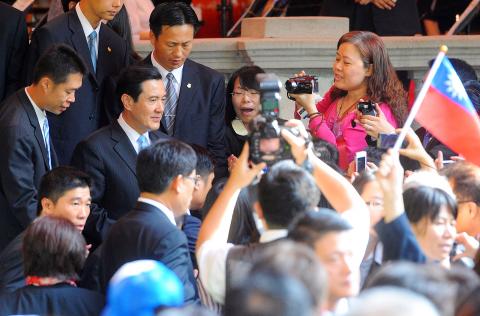President Ma Ying-jeou’s (馬英九) inauguration for a second term on Sunday, which was streamed live on the Internet, created quite a stir among Chinese netizens, with some saying they support Ma’s description of the cross-strait “status quo” as “one country, two areas” (一國兩區).
The mainstream media in China gave only limited coverage of the event in Taiwan, referring to Ma as “the leader of Taiwan authorities.”
However, some Chinese netizens said he should be called what he is — the president of the Republic of China. In some microblogs on www.people.cn and Baidu, two major news Web sites in China, it was reported simply that “President Ma Ying-jeou of the Republic of China has been officially sworn in.”

Photo: Wang Min-wei, Taipei Times
Some bloggers supported Ma’s statement in his inaugural address that the Republic of China comprises two areas — “mainland China” and Taiwan. However, others said they were opposed to the idea.
The majority of Chinese netizens who expressed their views on Ma’s inauguration said they support his policy of seeking peaceful development of cross-strait ties based on the so-called “1992 consensus.”
The “1992 consensus” refers to a tacit agreement supposedly reached between Taipei and Beijing that there is only one China, with each side free to interpret what “one China” means.
Some Chinese netizens said they hoped to see a “Greater Republic of China” if China and -Taiwan are united.
Other Chinese netizens complained about “selective” reporting of Ma’s inaugural speech on some Web sites, urging the editors to “publish the full text [of his speech] if you have the guts.”
After Chinese media reported that the food and drink at Ma’s inauguration party cost less than NT$1,600 per person, quite a number of Chinese netizens said they were surprised at how “frugal” Ma was compared with Chinese officials, who often go for lavish spreads.
While some Chinese netizens ridiculed Ma, saying he only pretended to be frugal, others said he had done a good job of exemplifying thriftiness and integrity.
Some used this “shining example” to make sarcastic comments, such as: “Wow, Taiwan has such a clean and competent leader. Alas, I can see the end of the days of a certain party [an indirect reference to the Chinese Communist Party].”
Another topic that was hotly discussed among Chinese netizens was a “state seal” that was handed to Ma.
A Chinese reporter who covered Ma’s inauguration posted this comment: “Who has ever seen our [Chinese] state seal?”
To which, a response read:, “Could it be that it has sunk in the Yellow River?”
Probably to avoid a repeat of the democracy craze that followed the live streaming of Ma’s election victory in January, few Chinese Web sites carried Ma’s swearing-in ceremony or inaugural speech.
Some sites removed footage of the event that had been posted earlier.
For example, on the popular Tudou site, the video on Ma’s -swearing-in was deleted.
In its place, a notice appeared that said: “The page you are seeking does not exist.”

Chinese Nationalist Party (KMT) Chairman Eric Chu (朱立倫), spokeswoman Yang Chih-yu (楊智伃) and Legislator Hsieh Lung-chieh (謝龍介) would be summoned by police for questioning for leading an illegal assembly on Thursday evening last week, Minister of the Interior Liu Shyh-fang (劉世芳) said today. The three KMT officials led an assembly outside the Taipei City Prosecutors’ Office, a restricted area where public assembly is not allowed, protesting the questioning of several KMT staff and searches of KMT headquarters and offices in a recall petition forgery case. Chu, Yang and Hsieh are all suspected of contravening the Assembly and Parade Act (集會遊行法) by holding

PRAISE: Japanese visitor Takashi Kubota said the Taiwanese temple architecture images showcased in the AI Art Gallery were the most impressive displays he saw Taiwan does not have an official pavilion at the World Expo in Osaka, Japan, because of its diplomatic predicament, but the government-backed Tech World pavilion is drawing interest with its unique recreations of works by Taiwanese artists. The pavilion features an artificial intelligence (AI)-based art gallery showcasing works of famous Taiwanese artists from the Japanese colonial period using innovative technologies. Among its main simulated displays are Eastern gouache paintings by Chen Chin (陳進), Lin Yu-shan (林玉山) and Kuo Hsueh-hu (郭雪湖), who were the three young Taiwanese painters selected for the East Asian Painting exhibition in 1927. Gouache is a water-based

Taiwan would welcome the return of Honduras as a diplomatic ally if its next president decides to make such a move, Minister of Foreign Affairs Lin Chia-lung (林佳龍) said yesterday. “Of course, we would welcome Honduras if they want to restore diplomatic ties with Taiwan after their elections,” Lin said at a meeting of the legislature’s Foreign Affairs and National Defense Committee, when asked to comment on statements made by two of the three Honduran presidential candidates during the presidential campaign in the Central American country. Taiwan is paying close attention to the region as a whole in the wake of a

OFF-TARGET: More than 30,000 participants were expected to take part in the Games next month, but only 6,550 foreign and 19,400 Taiwanese athletes have registered Taipei city councilors yesterday blasted the organizers of next month’s World Masters Games over sudden timetable and venue changes, which they said have caused thousands of participants to back out of the international sporting event, among other organizational issues. They also cited visa delays and political interference by China as reasons many foreign athletes are requesting refunds for the event, to be held from May 17 to 30. Jointly organized by the Taipei and New Taipei City governments, the games have been rocked by numerous controversies since preparations began in 2020. Taipei City Councilor Lin Yen-feng (林延鳳) said yesterday that new measures by